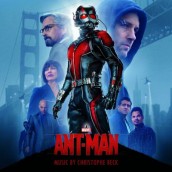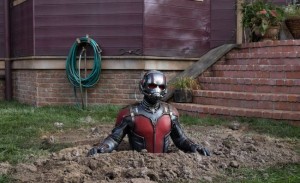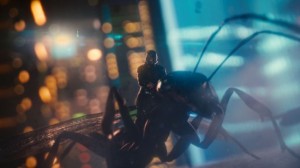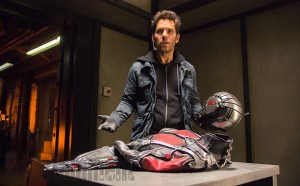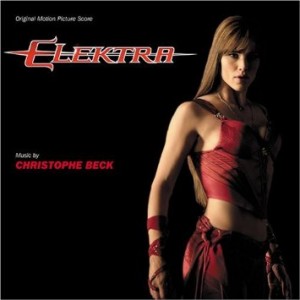Few Marvel superheroes might have an inferiority complex like Ant-Man. He’s a guy decked out in blue and red, wearing what appears to be some diver’s helmet, gifted with the ability to shrink down to insect size while still delivering a man-sized punch. Not exactly as cool as a mythic hammer, a repulsor ray equipped iron suit or an ability to turn into a big green rage engine. Plus, there’s that name, one subject to any number of self-effacing quips by Paul Rudd, an oft-comedic actor. You know THE DARK KNIGHT which is great indeed when it comes to giving composer Christophe Beck the ability to deliver music that’s knockout fun. Driven by a joyful symphonic theme that shouts “good guy” to the rafters while taking Marvel scores into a whole new realm of spy-jazz big-heist music, Beck can proudly call ANT-MAN one of the most enjoyable, unashamedly comic book scores of the genre that Marvel re-ignited, showing a sense of humor, adventure and emotion that’s distinguished Beck’s repertoire, while increasing it to new symphonic size.
A Canadian native who made his first big Hollywood splash with BUFFY THE VAMPIRE SLAYER‘s TV exploits, Beck has mainly specialized in the rocking, rhythmic approach to such comedies as THE HANGOVER, HOT TUB TIME MACHINE, TOWER HEIST, THE PINK PANTHER and any number of tween flicks like THE PERFECT MAN and ICE PRINCESS (certainly his dreamier, sensitive side in GUINEVERE, CHARLIE COUNTRYMAN and GOOD KIL: deserve as much notice). Beck’s boisterous and sunny string-driven sound has also jetted him up to the top of the kid-friendly castle with FROZEN, THE MUPPETS and the forthcoming PEANUTS: THE MOVIE. But whether showing his chops at grunge, r & b, hip-hop or techno-jazz, there’s been an adventurous voice in Beck’s work just as eager to get spotlighted – music capable of reaching Mount Olympus in PERCY JACKSON AND THE LIGHTNING THIEF or getting a power-suited jolt of gnarly strings and electronics in EDGE OF TOMORROW.
One of the first scores where Beck demonstrated his superhero stealth was in ELEKTRA, a DARDEVIL spin-off that Marvel would likely wanted to forget, but a picture that certainly showed he had comic book scoring chops. It’s a geek enthusiasm that now welcomely switches from martial arts Sais to miniaturization for the company’s way more successful second wave, especially with such an unlikely choice as ANT-MAN. Given his most auspicious genre shot yet, Beck’s music can hardly contain its joy as it zooms into the sewers and into the air on the backs of faithful insect steeds as ridden by Scott Lang (Rudd), a down-and-out dad (but top-rate break-in artist) given the chance for super-heroic redemption when the O.G. Ant-Man Hank Pym (Michael Douglas) suits him up in his silver age Marvel duds. With propulsive electronic rhythms and boldly symphonic music crafting a combo of high tech and old-school heroism, ANT-MAN sings with real melodic delight, seamlessly veering from retro-jazz break-ins to trumpeting do-gooding and the way odder percussive chattering of earth’s tiniest heroes, which jam with a surf guitar in one of the year’s most delightful cues. ANT-MAN‘s score is a triumph of thinking bold and big about the true, delightful nature of comic book films and scores as the kind of spirit-enhancing uppers that distinguish the Marvel Pictures brand, and Beck’s frothier music. It’s a score that will likely make Beck ANT-MAN‘s wingman for some time to come, while adding a whole new chapter of comic book scoring to his resume.
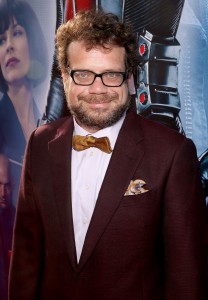
ANT-MAN composer Christophe Beck | ©2015 Christophe Beck (Photo by Jesse Grant/Getty Images for Disney)
ASSIGNMENT X: Had you ever encountered Ant-Man as a comic book character? And how did the film come your way?
CHRISTOPHE BECK: I was never a huge ant-man fan in particular, but definitely a comic book fan, like most other kids of my generation. I certainly knew of the character.
I’d been on a short list or two for Marvel movies prior to this one but couldn’t quite break through. On this film, a combination of things helped get me the gig, I think. The director, Peyton Reed, was someone I’d worked with before (in fact, his BRING IT ON was pretty much the first feature film for both of us), and music supervisor Dave Jordan was also very supportive of me in the hiring process, to name two. In fact, I should thank them: thanks Peyton, thanks Dave! Of course, the success of FROZEN and EDGE OF TOMORROW, which was still somewhat fresh in people’s minds, helped a bit too.
AX: It’s been quite a while since you took on your last Marvel film with ELEKTRA. How do you think the Marvel movies, and their scores have changed since that time?
BECK: As most industry observers know, things really took off for Marvel once they reclaimed creative control of most of their characters. They’ve had a ridiculous streak of big hits. Kevin Feige, who’s in charge over there, has crafted something truly special and epic in scope, with the interconnection of all the films and characters.
As for their scores, I certainly have my favorites. I’m not sure that there’s been any kind of change or evolution in the musical approach over time– each film takes on a bit of the character of the composer scoring it, and there have been a handful of us now. Of course that also makes it challenging to tie the films together, musically speaking. I know that Marvel is working hard to bring a bit more of a musical grand architecture to their films as a whole. I thought Brian Tyler and Danny Elfman did a great job on AGE OF ULTRON using some of Alan Silvestri’s themes from the first movie, and, I try to do the same in the ANT-MAN score. So, hopefully that helps a bit in the thematic cohesion department. It certainly helps that Alan wrote such a good theme!
AX: Do you think your own background doing pop-inflected comedy scores like THE HANGOVER series and GET HARD made you ideal to score a far more humorous superhero film? And do you think that doing such unheralded fantasy scores as PERCY JACKSON AND THE LIGHTNING THIEF and THE SEEKER also set you up well here?
BECK: I don’t think it’s a coincidence that my first Marvel film is a heist comedy, considering how many comedies I have worked on. As for the unheralded fantasy scores… well, yeah, they are indeed largely “unheralded” and I’m not sure the Marvel folks even know I worked on them. I’m still fond of both of those scores, so I try to mentally herald them to myself whenever I can!
AX: In terms of Paul Rudd’s character, Scott Lang is far from a superhero when we meet him. How did you want to play a guy who’s an ex con and can’t hold down a job, with no intentions of putting on a suit?
BECK: At first there were a number of scenes which featured a down-and-out Scott Lang, and there were some opportunities to portray this musically, but they were either cut from the film or eventually accompanied with source music, as opposed to score. But there’s a “blue collar” feel to a lot of the music in the heist scenes, with rhythm section and a smattering of guitar. That’s really the unique element here, the fact that it’s essentially a heist movie as much as it is a superhero movie. That’s what sets this movie apart from most other Marvel films.
AX: There’s an undeniable goofiness to any superhero calling himself ANT-MAN let alone from Scott. Did you want to tip your hat to the basic absurdness of the character? And on that note, how “light” did you want the score to be?
BECK: In fact, the word “absurd” was used often by Peyton in discussing the feeling he was after in some of the scenes. For example, at one point in the movie (also featured in the trailer) there’s an intense and epic battle between Ant-Man and his opposite number Yellowjacket, both shrunken to insect-size, on a child’s toy train set. It’s shot and edited as if larger than life– we, the audience, get to experience the battle from the perspective of the combatants, and it’s huge. The camera then pulls back and we get a glimpse of the action from a more normal-sized perspective, and suddenly you’re reminded that it’s all taking place on a Thomas the Train set.
Musically, for this moment, and others like it, I tried to acknowledge this absurdity by using rhythm section and odd meters and a certain wildness to the orchestration, and evoking an out-of-control feeling that Peyton would describe as “Mr.-Toad’s-Wild-Ride”-esque.
AX: Given such a literally infinitesimal character, how important was for you play a bigger symphonic size? And conversely, did you ever want the music to get “small?” with a sense of wonder?
BECK: We considered trying to portray “smallness” in the music. There’s actually a lot of fun to be had in this area: I thought about using artificially sped-up sounds, or actual tiny playable instruments. The problem is, this is not a story about miniaturization. It’s a story about a hero who is also a dad. So yes, it was important to have a big symphonic sound as the backbone of the score, and to let the sound design and visual effects (which look and sound astonishing) take care of the “small” of it all.
AX: How did you want to play the “father-son” relationship between Scott Lang and Hank Pym, as well as Scott’s family ties?
BECK: There’s a musical theme in the film that represents family, and it’s a crucial one. There’s the father-son-like relationship you mentioned between Hank and Scott, but equally important are the relationships between characters that are actually related! For example, as far as I’m aware, Ant-Man and Hawkeye are the first Marvel heroes who are also parents. And of course there’s the relationship between Hank and his daughter, Hope. This “family” theme is doubly important because it eventually will come to signify the emergence of Hope as something of a hero herself. With any luck this theme can travel with her should she appear in any more Marvel movies.
AX: Another important “family” comes from the telepathic bond that Scott makes with the titular insect. How did you want to play that relationship, and what was the challenge of giving musical personality to ants?
BECK: There are actually four different species of ants featured in the story. One in particular seemed to deserve its own identity: the bullet ant. Being primarily indigenous to South America, we used some ancient Aztec drums and tribal flutes. Peyton was pretty clear that he wanted this more regional flavor for the bullet ants, and it took me a few tries until I really embraced the concept, but I love how it turned out in those scenes.
AX: What makes a memorable superhero theme?
BECK: Simplicity? Tasteful repetition? Small musical intervals between notes? Luck? Inebriation? The awesomeness of its composer? I wish I knew!
AX: Conversely, how did you want to play his arch nemesis Yellowjacket?
BECK: It’s not really the converse, is it? In a way, villain themes are easier, because the underlying emotions are a little more straightforward. For the Yellowjacket there’s a more traditional theme, presented in traditional fashion, but augmented with processed electronics to convey the crazed and obsessed nature of the character as well.
AX: How are brass and percussion essential to superhero scoring muscle, especially in ANT-MAN?
BECK: Well, you said it, they are essential. Especially in a Marvel film, where the filmmakers tend to gravitate toward that classic, symphonic, thematic film sound. Someday, I’m sure, a composer will write an awesome, classic, superhero score without brass or percussion. But I doubt that it will be me!
AX: Industrial spying, espionage and general breaking-in play big parts in ANT-MAN. How did you want to play that aspect of it?
BECK: This ties into an earlier question- the fact that this is Marvel’s first “heist comedy.” With Marvel, you’ll never stray too far from a traditional orchestral approach, but for some of these heist-y scenes I was able to sneak in a synth or two to evoke a bit of the high tech world our characters operate in. There were also a number of sequences that featured rhythm section, complete with drums and electric bass.
AX: Could you tell how the film’s tone changed directors from Edgar Wright to Peyton Reed?
BECK: Ha, good question. I’m dying of curiosity to know the answer myself. It would seem to me that the absurdity you referred to in an earlier question is a hallmark of Wright’s style, and there’s definitely a lot of that is in this movie, including some of the more genre-specific music choices, like the South American drums for our bullet ants, or a “surf-chestral” version of the main theme as Ant-Man cruises a water pipe on a raft made of thousands of ants. This absurd style is evident even where there is no music- for example, there’s are a couple of extended sequences near the end where music drops out and we hear only highly stylized and exaggerated sound effects.
AX: I’ve heard that entering the Marvel Universe can be demanding for filmmakers and composers. What was your experience like?
BECK: I heard that too, mostly from the people at Marvel themselves, who I must say have an almost perverse pride in the craziness of their post production process. It’s basically a continuation of the trends we’ve seen in the last few decades, only taken to their absolute extremes. Unexpected VFX shots, additional shooting, significant re-edits, dropping whole scenes, reshuffling whole reels… it’s all on the table, right up until a week or two before the premiere. But you can’t argue with Marvel’s track record, so it’s tough to say that there’s anything really wrong with their process, chaotic though it may be. It really wasn’t a problem as a result. I dare say it was almost “fun”. (Almost.)
And, really, enough people warned me, that I was ready. I had a small, excellent crew working full time on this score. Leo Birenberg, who’s been working with me for five or so years now, wrote a number of impressive cues including some great action music. Zach Robinson and Jeff Morrow also contributed some excellent material. And my regular production crew, including music editor Fernand Bos, engineer Casey Stone, my orchestrator Kevin Kliesch and my orchestrator and conductor Tim Davies really rose to the occasion. I couldn’t have done it without them.
AX: When so many DC superhero films get crushed by their own seriousness and darkness, was it refreshing to do a comic book movie that was about having fun? And do you think that’s something that all comic book films, and scores, should have more of?
BECK: I like having both styles available to me as a fan of movies in general. Both styles can work, as we’ve seen plenty of evidence with great movies from both DC and Marvel. It’s great to watch the genre mature and evolve over time, as a fan.
AX: You’ve next got THE PEANUTS MOVIE coming up. What’s it like to score such iconic characters, let alone to pick up the scoring baton from Vince Guaraldi? Will we get a similarly jazzy approach?
BECK: I think everyone can agree that it wouldn’t be a Peanuts movie without Guaraldi. There’s of course the classic “Linus & Lucy” which makes a couple of appearances in the film, as well as a few of his other well-known pieces. The score I wrote takes a more modern symphonic approach, with only occasional excursions into jazz-combo-land, however. Today’s musical landscape is quite different from when those Guaraldi-scored specials aired. Fox is hoping to make a movie with wide appeal here, and to score it with a combo might make you and me and others of our generation feel warm and nostalgic, but to most everyone else it would just feel a bit old fashioned. That said, I tried where I could to evoke the feel of those old specials, just because I love them so much! So every once in a while I try to drop in that classic piano combo sound.
AX: What’s it like to introduce a character into the Marvel movie universe who’ll be continuing in it in even bigger ways? And how do you see your scoring for Scott developing along with them?
BECK: I try not to think too hard about Marvel’s 15-year, 30-movie plan! I focus on what’s in front of me. That said I do feel I tend to put a little extra pressure on myself when I know that the music might live on past the film in sequels or spin-offs. As for my role in any future Marvel plans, I think they know I really enjoyed scoring ANT-MAN, and I think they know my phone number! Of course I’d love to work with them again. I’ll keep my fingers crossed.
Related: Movie Review: ANT-MAN
ANT-MAN is in theaters now, with Christophe Beck’s score available digitally and on CD August 7th HERE
Visit Christophe Beck’s website HERE
Follow us on Twitter at ASSIGNMENT X
Like us on Facebook at ASSIGNMENT X
Article Source: Assignment X
Article: Interview: ANT-MAN Composer Christophe Beck
Related Posts:




